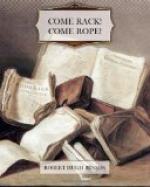* * * * *
There was a long silence. From the direction of the kitchen came the sound of cheerful voices, and the clatter of lids, and from the walled garden outside the chatter of birds....
At last the girl spoke.
“I cannot believe it without evidence,” she said. “It may be so. God knows! But I do not.... Mr. Biddell?”
“Well, mistress?”
The lawyer’s head was sunk on his breast; he spoke listlessly.
“He will have given some writing to Mr. Topcliffe, will he not? if this be true. Mr. Topcliffe is not the man—”
The old man lifted his head sharply; then he nodded.
“That is the shrewd truth, mistress. Mr. Topcliffe will not trust to another’s honour; he hath none of his own!”
“Well,” said Marjorie, “if all this be true, Mr. Topcliffe will already have that writing in his possession.”
She paused.
“Eh?” said the lawyer.
They looked at one another again in silence. It would have seemed to another that the two minds talked swiftly and wordlessly together, the trained thought of the lawyer and the quick wit of the woman; for when the man spoke again, it was as if they had spoken at length.
“But we must not destroy the paper,” he said, “or the fat will be in the fire. We must not let Mr. FitzHerbert know that he is found out.”
“No,” said the girl. “But to get a view of it.... And a copy of it, to send to his family.”
Again the two looked each at the other in silence—as if they were equals—the old man and the girl.
II
It was the last night before the Londoners were to return.
They had lived royally these last three months. The agent of the Council had had a couple of the best rooms in the inn that looked on to the market-square, where he entertained his friends, and now and then a magistrate or two. Even Mr. Audrey, of Matstead, had come to him once there, with another, but had refused to stay to supper, and had ridden away again alone.
Downstairs, too, his men had fared very well indeed. They knew how to make themselves respected, for they carried arms always now, since the unfortunate affair a day after the arrival, when two of them had been gravely battered about by two rustic servants, who, they learned, were members of a Popish household in the town. But all the provincial fellows were not like this. There was a big man, half clerk and half man-servant to a poor little lawyer, who lived across the square—a man of no wit indeed, but, at any rate, one of means and of generosity, too, as they had lately found out—means and generosity, they understood, that were made possible by the unknowing assistance of his master. In a word it was believed among Mr. Topcliffe’s men that all the refreshment which they had lately enjoyed, beyond that provided by their master, was at old Mr. Biddell’s expense, though he did not know it, and that George Beaton, fool though he was, was a cleverer man than his employer. Lately, too, they had come to learn, that although George Beaton was half clerk, half man-servant, to a Papist, he was yet at heart as stout a Protestant as themselves, though he dared not declare it for fear of losing his place.




